Macrinus
Marcus Opellius Macrinus (*164 or 165): Roman emperor, ruled fourteen months in 217-218.
Early Life
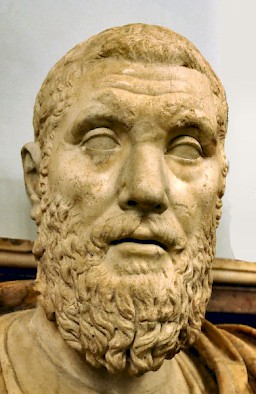
The early life of the emperor Marcus Opellius Macrinus is not well-known. His reign was an interlude between two groups of two emperors of the same, Severan, dynasty, and although Macrinus was recognized by the Senate, he was eventually regarded as an usurper. Consequently, there were many slanders about his early career: he was rumored to have been a gladiator or to have prostituted himself. This information can be ignored: if he really had acted in a despicable way, he would never have reached the important offices that he occupied. Still, much is unclear and a modern biographer of the emperor is faced with all problems that are inherent to hostile sources. Not even his year of birth is certain: the historian Cassius Dio, who knew Macrinus personally, thinks that he was born in 164, but the Chronicon Paschale thinks that it happened in 166.
What appears to be certain, however, is that Marcus Opellius Macrinus was born in Caesarea, the capital of the Roman province of Mauretania Caesarienis (modern Cherchell in Algeria). Although our sources say that he was from a poor family, his parents must have belonged to the local elite, because they could send their son to school. He became a lawyer, the normal office for an ambitious young Roman, and was even able to migrate to Rome itself. Here, he seems to have been regarded as a typical small-towner: he was no match for the clever legal experts, but his provincial honesty made him friends. As Cassius Dio says: "his knowledge of the laws and precedents was not so accurate as his observance of them was faithful".note
In Rome
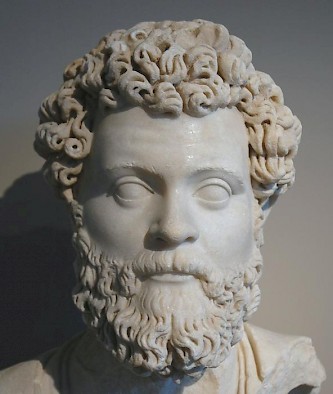
The fact that Macrinus was both reliable and helpless, made him a perfect political friend for the powerful praetorian prefect of the emperor Septimius Severus, Gaius Fulvius Plautianus, who occupied this office between 197 and 205. The man from Mauretania occupied a procuratorship, which simply means that he was responsible for something. He must have done his job well, because the praefectus urbi, an influential senator from Hispania named Lucius Fabius Cilo, was able to prevent Macrinus' dismissal when Plautianus fell from power. This suggests that the procurator's qualities outweighed the fact that he had wrong friends, or that he had shown a considerable independence from Plautianus.
His career was even advanced. He was briefly responsible for the maintenance of the Flaminian Road (praefectus vehiculorum per Flaminiam), and may ahve married (if not earlier), to an anonymous lady who was a daughter of Haius Diadumenianus, who had once been procurator of Mauretiania.
In 208, he served as inspector of the imperial purple wardrobe. This was possibly the title of a court function that had nothing to do with the emperor's clothes. Macrinus must have been close to the ruler and it is likely that he accompanied Septimius Severus on his campaign in Scotland.
Until now, Macrinus had pursued the normal, equestrian career for a man who did not belong the senatorial elite, although he had been spectacularly successful. When Septimius Severus died in February 211, his sons and successors Caracalla and Geta chose the Mauretanian to take care of the finances of the imperial family (procurator rei privatae). He was now one of the most important courtiers and must have known everything that happened in the imperial palace, including the details of the bloody murder of Geta by Caracalla in December 211.
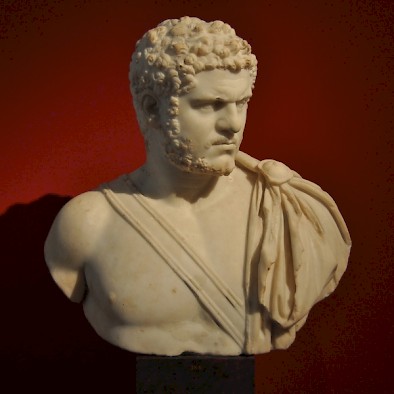
Almost immediately after this shocking incident, Caracalla appointed Macrinus as praetorian prefect, the highest office that a non-senator could dream of. It is not known whether this was a reward for a tactical silence, or that Caracalla needed to boost his prestige by promoting a generally respected man to an influential position. (After the fall of the powerful Plautianus, there were two praetorian prefects, to prevent new concentrations of power. Plautianus' colleague was the aged Oclatinius Adventus.)
Macrinus now commanded the emperor's personal guard, had juridical duties, and was a member of the consilium principis (the emperor's advisory board). He must have been among those who backed the Constitutio Antoniniana, in which full citizen rights were given to all freeborn men in the Roman empire. The praetorian prefect also commanded the Second Legion Parthica, which was garrisoned in Alba near Rome and was the empire's strategic reserve. It is likely, but not certain, that Macrinus accompanied Caracalla to the Rhine provinces, where the emperor defeated the Alamanni in September 213.
To the East
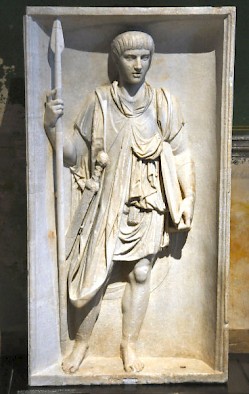
In 214, Caracalla opened the famous baths that are called after him (was Macrinus present?), and left Italy for a tour through the eastern provinces. The emperor visited the provinces of the Lower Danube, Bithynia, Asia, and arrived in Antioch in the summer of 215. The winter was spent in Alexandria in Egypt, and in May 216, Caracalla launched a campaign against the Parthian Empire. Macrinus and the Second legion Parthica were certainly present, but it is not known whether the praetorian perfect also accompanied the emperor during his tour.
The Parthian war had been in the air for some time. Two Parthian kings, Vologases VI and Artabanus IV, had opposed each other in a civil war since 214 and the Romans had been watching this conflict with selfish considerations. Caracalla had ordered the annexation of two buffer states, Edessa and Armenia, to improve the Roman positions in Mesopotamia before the war was to start. The Armenians had refused to come to terms, but Edessa had surrendered and was to offer hospitality to the emperor.
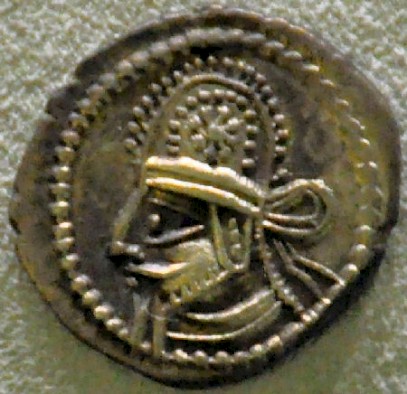
Caracalla and his advisers preferred diplomacy to create an even better situation: the emperor proposed Artabanus to marry his daughter. In the official propaganda, Caracalla wanted to unite the two civilized empires of the world. If this proposal was serious, he later changed his mind, because when Artabanus appeared in the spring of 216, the Romans unexpectedly attacked the visitors. The Parthian king managed to escape, but the war had begun.
The Roman army, including the imperial guard, II Parthica, and Macrinus, marched to the east, reached Nisibis, crossed the river Tigris, and invaded Adiabene (the third-century name of the area once known as Assyria). Macrinus seems to have played an important role, because when the emperor returned to his winter quarters in Edessa, the praetorian prefect received the title of vir clarissimus and the right to wear the emblems of a consul.
Coup d' état
What happened next, is unclear. Our sources say that Macrinus discovered that Caracalla wanted to get rid of his praetorian prefect, but many details remain obscure. However this may be, in the spring of 217, Macrinus was no longer in charge of II Parthica, which may or may not be a sign of disfavor. On the eighth of April, the emperor and his courtiers made a brief trip to the world famous temple of the moon god Sin of Harran. When Caracalla halted to perform natural functions, he was assassinated by one of his bodyguards, Julius Martialis, who had a private grudge against the ruler, because he had not been given the post of centurion. Our sources all agree that Macrinus was behind the attack, but this may be slander.
Anyhow, he was proclaimed emperor on the eleventh of April, and accepted as title Imperator Caesar Marcus Opellius Severus Macrinus Augustus, being the first ruler of the Roman world who had descended from a non-senatorial family. It cannot have surprised many people, because the emperor Commodus (180-192) had done much to take away power from the Senate and during the reign of Septimius Severus, the praetorian prefect Gaius Fulvius Plautianus had obtained very great influence. The Senate immediately recognized the new emperor, and although Macrinus allowed Julia Domna to retire peacefully, she started to plot against the new ruler. Macrinus ordered her to settle in Antioch, where the powerful mother of Caracalla facilitated the regime change by committing suicide.
Emperor
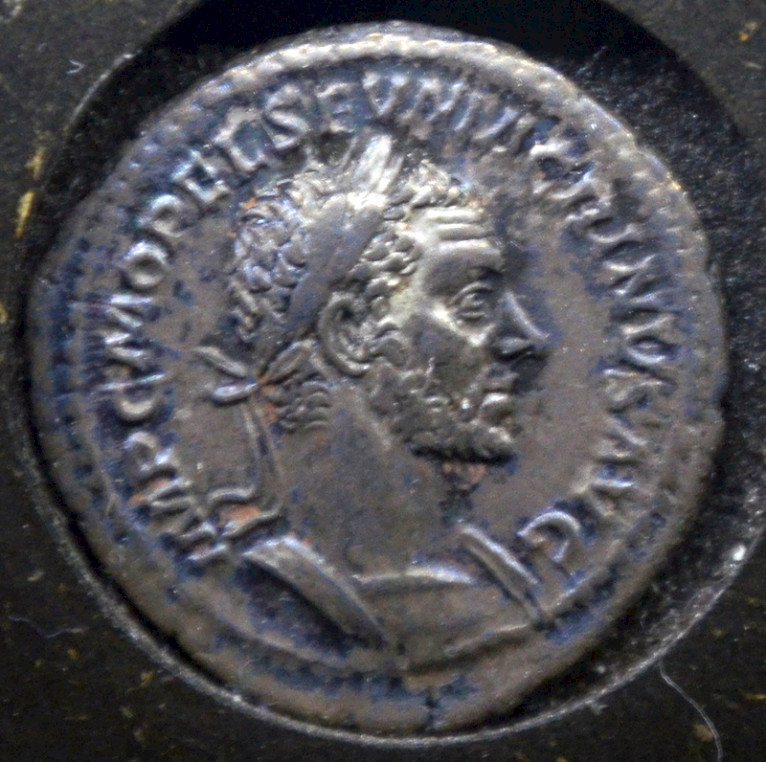
Macrinus started his reign by paying extra money to his soldiers (donativum) and appointing his nine year old son as successor (caesar). This was a masterstroke. The boy was called Diadumenianus because he had been born with a caul, but now it seemed as if he had been destined by the gods to become ruler of the world, because the diadem was the attribute of royalty. In other words, Macrinus claimed that the gods had wanted him and his son to become emperors.
Another early measure was the revaluation of the denarius. During the reign of Septimius Severus, there had been 1.85 gram of silver in a coin, but there had been several debasements and since two years, only 1.45 gram remained. Macrinus ordered a return to the old standard, which made it difficult to pay the legionaries, whose pay had been risen by Caracalla. At the same time, he tried to curb expenses and improve the financial situation of the empire.
In the early summer, the Parthians retaliated and invaded eastern Mesopotamia. The armies of king Artabanus and emperor Macrinus met near Nisibis, and the outcome is presented in our sources as a Roman defeat - but the sources are generally hostile, and perhaps the fight was less decisive than is assumed. (Had the new emperor really been defeated, he would have been killed by his soldiers straight-away; Cassius Dio's account contains a lacuna.) An armistice was concluded, and - according to Dio - the Romans agreed to pay an indemnity. Later, this was regretted, but in the summer of 217, it was not a bad idea to blame Caracalla for a major international crisis, search for peace, and concentrate upon other things. After all, the new emperor still had to consolidate his power, and Artabanus had his own reasons to come to terms: he was still involved in a civil war with his brother Vologases.
The war was over when the envoys of the Senate arrived in June, confirming Macrinus' emperorship, and offering him the title of "father of the fatherland" (pater patriae). The title of parthicus maximus, which the Senate was to offer a couple of months later, was declined.
In the late summer and autumn, Macrinus was able to organize Armenia, which had been demanded for the Roman empire by Caracalla, and in the winter of 217/218, the final peace treaty with the Parthians was signed. When all was said and done, the eastern war had not been unsuccessful: Edessa and Armenia had been brought more firmly into the Roman sphere of influence, at the price of an indemnity and a fight that had not ended in a victory. When the new year, 218, began, Macrinus occupied the consulship, and must have felt sure that he was master of the empire.
Downfall
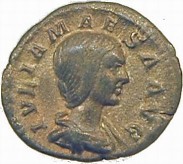
But he was not. Caracalla's mother Julia Domna had committed suicide, but her sister was still alive. Julia Maesa wanted to restore the dynasty that had been founded by her brother-in-law Septimius Severus, and she had a handsome grandson that would make a good emperor: Varius Avitus Bassianus, a fourteen-year old boy who was very popular among the soldiers of the eastern legions, because he acted as priest in the cult of the beloved Syrian sun god Elagabal in Emesa. Julia Maesa paid money to the garrison at Raphanaea, halfway Antioch and Damascus, and on 16 May, the Third Legion Gallica switched its allegiance from "the usurper" to the boy Bassianus.
Macrinus heard about the rebellion in Antioch and immediately promoted Diadumenianus to the rank of co-ruler (augustus). The religious card -the gods had wanted Macrinus and his son to be emperors- had been played once and could be played again. Yet, most people preferred the Syrian to the Mauretanian boy. When Macrinus sent his praetorian prefect, Ulpius Julianus, to the south with the Second legion Parthica, he was lynched and the legionaries sided with Bassianus too.
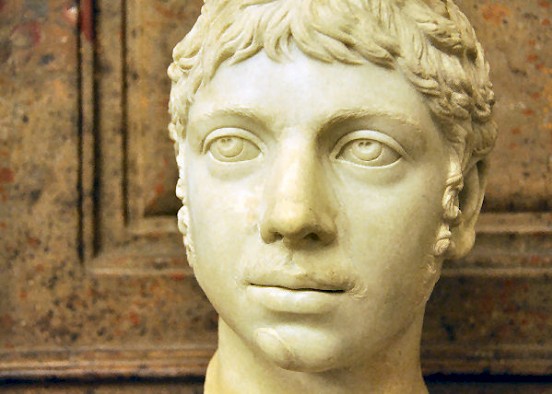
II Parthica and III Gallica now advanced to the north, to Antioch. On 8 June 218, the last loyal troops of Macrinus were defeated. Diadumenianus fled to the Euphrates but was killed, "having gained nothing from the imperial power but his death at the hands of the soldiers", as the author of the Historia Augusta summarizes.note Macrinus himself escaped from the battlefield and fled to Rome, hoping to gain support from the Senate and the people, but he was seized in Chalcedon in Bithynia by Aurelius Celsus and taken to Cappadocia, where he was decapitated by Marcianus Taurus. He had not been incapable to rule, but once he ruled, he could not make the people forget that he had been involved in a plot against Caracalla. The Senate pronounced a damnatio memoriae.
Now, the reign of Bassianus could begin. Like Macrinus, he was not a senator, but at least he belonged to the imperial dynasty. Soon, the Romans were to regret that they had made him emperor, because the young man introduced unusual religious practices in Rome. He is better known under the name of his god: Heliogabalus.
Sources
The main sources are the Roman History by Cassius Dio, book 79; book 4 and book 5 of the History of the Roman Empire by Herodian; and the biography in the Historia Augusta, which can be found here.